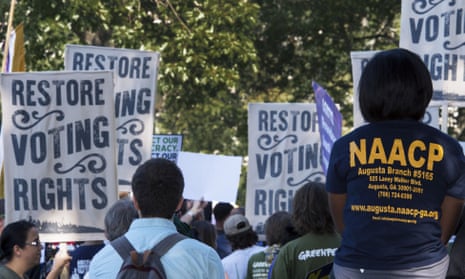Last Friday was a big day for voting rights in the United States. Federal courts struck down restrictive voting laws in Kansas and Wisconsin. And in a particularly important decision, the fourth circuit court of appeals delivered a stinging rebuke to North Carolina’s egregious vote suppression law. As the court observed, North Carolina legislators didn’t even try to hide the core purpose of the law: to stop African Americans from getting to the polls.
The politics of North Carolina are a perfect illustration of what led the Republican party to nominate Trump. The southern state, which has seen a large influx of people into its prosperous urban centers, is becoming more liberal – Barack Obama carried the state in 2008, and Mitt Romney carried it by only two points in 2012. North Carolina Republicans have not reacted to these trends, however, by becoming more moderate.
The clash between a Republican party running at full speed to the right while its population was trending to the left led North Carolina to pass a particularly terrible anti-voting law. In 2013, a bare majority of the US supreme court gave the green light to North Carolina by striking down a provision of the Voting Rights Act that required states, such as North Carolina, that had a history of discrimination to preclear electoral law changes with the Department of Justice.
In addition to a requirement that voters show particular forms of ID, the state eliminated Sunday voting, narrowed the window for early voting and eliminated same-day vote registration and early registration for 16- and 17-year olds. Voter ID requirements at least have the superficial appearance of addressing the integrity of elections, although in practice the justification is bogus. But most of the provisions in North Carolina’s attack on the right to vote had no purpose, even in theory, other than to make it harder for people to vote.
Or, to put it more accurately, make it harder for some people to vote. In a careful, detailed, and absolutely devastating opinion for a unanimous three-judge panel, Judge Diana Motz demonstrated that the law “target[ed] African Americans with almost surgical precision”. The discriminatory intent that could be clearly inferred from the nature of the statute itself was not well hidden.
As Motz pointed out: “[B]efore enacting that law, the legislature requested data on the use, by race, of a number of voting practices. Upon receipt of the race data, the General Assembly enacted legislation that restricted voting and registration in five different ways, all of which disproportionately affected African Americans.” When you request data about how changes in vote laws will affect the African American vote, and then change laws in ways deliberately designed to suppress it, there’s really no room left for doubt.
The story in Wisconsin is similar, although its legislature was a little better at hiding its tracks. Republicans in the state have used lower off-year turnouts to win elections and pursue a very aggressive conservative agenda in a state that perennially votes Democratic in presidential elections. It passed vote restrictions that disproportionately affect people of color and the poor, and these restrictions were also struck down on Friday. Both of these decisions materially affect the elections in November. Not only will Trump be targeting North Carolina and Wisconsin; both states have Senate elections, with control of the chamber responsible for confirming (or not confirming) supreme court nominees looking to come down to the wire.
The nakedness of these vote suppression tactics is so obvious that earlier in July, the conservative fifth circuit court of appeals struck down similar legislation in Texas. While the supreme court made it harder to challenge these tactics by gutting the voting rights law, there are still remedies available and federal courts have finally begun to push back against these attempts to suppress the votes of people of color and the poor.
These are important victories. But they also underscore the importance of getting a supreme court majority that will fight back against vote suppression rather than facilitating it. Whether this happens will be determined in November, not only in the contest between Clinton and Trump but in the contest to control the Senate.

